History
2001
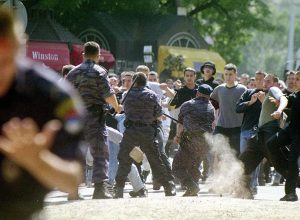
(FOTO:Blic/Andreja Ilić)
Belgrade’s first Pride Parade was organised on 30th June 2001 under the slogan “There is Space for All of Us”. The small number of those who gathered at the Republic Square were attacked by members of right wing organisations and sports fan groups. The police forces were insufficient and unprepared and did not react adequately to the violence. More than forty people were injured, and there was no Government reaction.
2002
Law on Broadcasting foresees fight against hate speech in radio and TV broadcasts, including one based on sexual orientation.
2003
Law on Public Information was adopted, sanctioning hate speech, including one based on different sexual orientation.
2004
A group of activists gathered in 2004 with the intention to organise a new Pride. The preparations took several months, but after the escalation of violence in Kosovo and the burning of mosques in Belgrade and Nis in March 2004, further preparations ceased and the Pride was cancelled.
2005
Labor Law was adopted, banning workplace discrimination based on sexual orientation for the first time.
Law on Higher Education that guarantees equal access to higher education for all, including citizens of different sexual orientation, was adopted in the National Assembly of Serbia.
2006
Law on Higher Education that guarantees equal access to higher education for all, including citizens of different sexual orientation, was adopted in the National Assembly of Serbia.
2007
Blood Transfusion Institute agreed to change a section of its database which existed until that year under the title “0041 – Highly risky sexual behaviour: homosexual, bisexual, promiscuous”.
2008
Law in Personal Data Protection was adopted, stipulating that the data reffering to, among other things, personal sex life, is particulary sensitive and can only be collected on the basis of informed consent.
Serbian Medical Society Informed Labris that “same sex orientation is not a disease”.
2009
Gay Straight Alliance press conference at Sava Center was banned, resulting in LGBT activists protesting in front of this conress centre.
In spite of strong resistance by religious communities and the withdrawal of the law from the parliamentary procedure, the Law on the Prohibition of Discrimination was adopted, completely prohibiting discrimination based on sexual orientation in all situations.
A Pride Parade under the slogan “It is Time for Equality” was prepared and was to be held on 20th September 2009. The realisation of the event was supported by many public figures, international organisations and government representatives. There were numerous public threats by sports fan groups and extremist against Pride Parade organisers and its participants. The authorities pressured the organisers to move the event to the Usce park. The Ministry of Internal Affairs banned the event a few days before it was supposed to take place.
2010
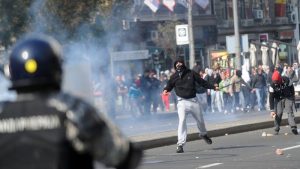
(FOTO: AFP)
Pride Parade under the slogan “We Can Do It Together” was held. The walks began on 10th October 2010. In Manjez park gathering more than 500 partiipants. Although the authorities gave guarantees to the organisers, the assessment was poor and there were massive conflicts between the police and hooligans that took place in central Belgrade, the estimate is that there were 6,000 police officers in the streets and the same number of hooligans. During the riots 132 policemen and 25 citizens were injured, and around 250 people were arrested. The same year marked the first time Pride Week was organised, and it remained the only part of Pride 2010 that was without security issues.
2011
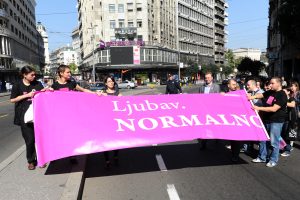
(FOTO:Vesna Lalić)
The Constitutional Court of Serbia made a decision that the 2009 Pride Parade ban was unconstitutional.
Law on Youth was adopted, banning discrimination of youth, including one based on secual orientation.
A first instane verdict for grave discrimination against LGBT+ persons was passed against the politiian Dragan Markovic Palma.
Law on Social Welfare was adopted, forbidding discrimination based on sexual orientation, among other things, of social welfare users.
Belgrade Pride 2011 that was held under the slogan “Pride. Normally” was banned with the explanation that the state was unable to guarantee the safety of participants. As a reaction to the ban, the activist organised “Pride in Private” at the Belgrade Media Centre, after which they went out onto the main Belgrade street, spilling rainbow colours on the roadway and stopping the traffic whilst carrying the banner that stated “Love. Normally“. The Pride received strong support in the country and abroad. The Pride Week was held without incidents, and with much more diverse agenda.
Amendments to the Law on Health Insurance stipulate that at least 65% of the cost of a sex change medical treatment conducted for medical reasons shall be secured form the funds of the national health insurance.
2012
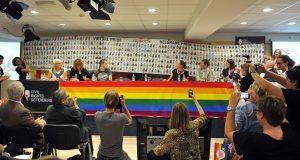
(FOTO:Vesna Lalić)
Amendments of the Criminal Code introduced the legal concept of hate crime whereby the fact that a crime was committed because of one’s sexual orientation, among other things, would be considered as an aggravating circumstance.
The Constitutional Court of Serbia banned the far right Patriotic Movement “Obraz”, whose members were the most responsible for organized violence at the 2010 Pride Parade.
Belgrade Pride 2012 under the slogan “Love, Faith, Hope” was again banned by the state. The official explanation was that the state was still unable to guarantee security at the event, and the decision was given to the organisers just before the event. As a reaction to the ban, the activists again organised another “Pride in Private” at Belgrade Media Centre, after which went in front of the building and announced the date of the 2013 Belgrade Pride. The Pride Week went through peacefully except for massive extremists protests before the exhibition “Ecce Homo” in which the author used Biblical motives. In spite of the protests, exhibition was held at the Centre for Cultural Decontamination with a large audience.
2013
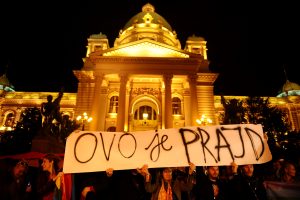
(FOTO:Vesna Lalić)
The Constitutional Court of Serbia decided that the 2011 Pride Parade ban was unconstitutional.
The state banned the Pride Parade for the third year in a row. When the organizers were informed about the ban, they organised a Midnight Pride that began in front of the National Assembly of Serbia. This event gathered a large number of activists, LGBT+ community members and supporters. The international public and the media dubbed the event the Stonewall of Eastern Europe.
Amendments to the Law on Pupil and Student Standards were adopted to include provisions on the prohibition of discrimination, violence and abuse in institutions based on sexual orientation.
A Law on Adult Education was adopted, which mentions sexual orientation in its section on equal opportunities.
2014
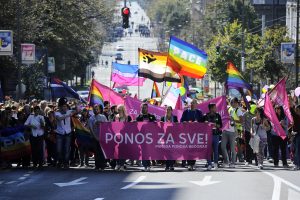
(FOTO:Vesna Lalić)
On 28 September 2014 the first Belgrade Pride without incidents and organised violence was successfully held. The Pride Parade was held under the slogan “Pride for All”.
Law on Electronic Media was adopted mentioning sexual orientation as one of the bases to ban discrimination, hatred and violene in media broadcasts. At the same time a new Law on Public Information and Media was adopted, and its two articles mention sexual orientation as a basis to ban hate speech and distribution of media information interpreted as acts of violence and which may cause serious direct and irreparable consequences. Law on Execution of Non-Institutional Sanctions and Measures was adopted, stipulating that a citizen who is subject to these measures and sanctions must not be put in an unequal position, among other things, due to his or her sexual orientation.
2015
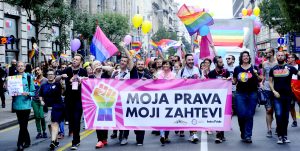
(FOTO:Vesna Lalić)
Belgrade Pride 2015 was held on 20th September 2015 under the slogan “My Rights, My requests”. That year Belgrade Pride became a member of the European Pride Organisers Association (EPOA) and the world-wide association of Pride organisations (InterPride). Pride Week and Belgrade Pride were held without incidents, with reduced police presence. Government representatives gave even more affirmative statements regarding the respect for human rights of the LGBT+ community and supported the realisation of the Pride Parade.
2016
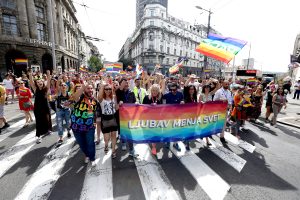
(FOTO:Vesna Lalić)
The Pride Parade was successfully held for the third time in a row on 18th September 2016. It gathered 2,000 participants under the slogan “Love Changes the World”, while more than 25 events took place during Pride Week. All these events were held without incidents and with an even more reduced police presence.
During an appointemnt of the members of the Governments of Serbia, the Prime Minister informed the public that the new Minister of State Administration and Local Self – Government – Ana Brnabic is a lesbian.
2017
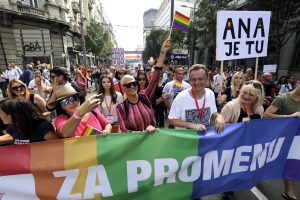
(FOTO:Vesna Lalić)
June 29 – Ana Brnabic stepped on the position of the President of the Serbian government as the first woman and out lesbian.
July – Pride Parade Oranising Committee announces Pride under the slogan “For Change” and for the first time clearly demands from the government to legally regulate same-sex communities.
August – The first Pride Info Centre was opened for 30 days and was visited by more than 3,000 people. During the duration of the first Pride Info Centre, citizens as well as LGBT+ people had a chance to get information about the events of Pride Week as well as to get information about the LGBT+ rights movement.
September 2017 – Serbian Prime Minister Ana Brnabic and two ministers were part of the fourth consecutive Pride Parade that was attended by more than 2000 people.
2018
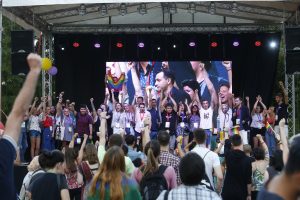
(FOTO:Vesna Lalić)
May 17th - Belgrade Pride has been announced for September under the slogan "Reci da! (Say Yes!)", with two clear demands addressed to the state: passing the Law on Registered Same-Sex Partnerships, as well as the Law on Gender Identity. August 16th - The Pride Info Center has reopened, as an inclusive and safe space in one of the main and busiest streets of Belgrade. The new feature was that the Center continued to operate even after Pride, making a fresh, larger space for lectures, panel discussions, film screenings, HIV testing, and a large number of humanitarian actions... By the end of 2018, the Center was visited by over 10,000 people. September 16th - Belgrade Pride was successfully held for the fifth consecutive time. During Pride Week, 65 events were organized at multiple locations in Belgrade. Over 2,500 people participated in the Pride March, and the number of police officers present was significantly lower. For the first time after Pride, a multi-hour entertainment program was held in Studentski Park. November 2nd - The first criminal verdict was issued in which hatred towards a member of the LGBTI+ community was considered as a distinct aggravating circumstance in determining the sentence. Although the criminal offense motivated by hatred was introduced as a special provision in Serbia's Criminal Code in 2012, making it a mandatory aggravating circumstance, this was the first case in which this provision was applied.
2019
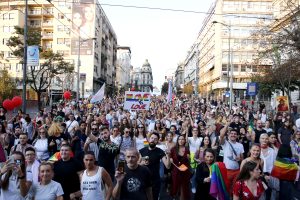
(FOTO:Vesna Lalić)
2020
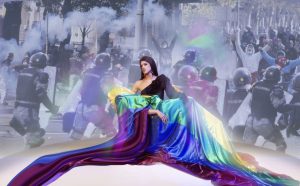 FOTO:Goran Popovski
FOTO:Goran Popovski
In 2020, Belgrade Pride took on a different shape due to the pandemic, under the slogan “In solidarity Even Between Four Walls” (Solidarni i u četiri zida). Solidarity and mutual aid cannot stop even under extraordinary circumstances, isolation and social distancing. Therefore, this year's Pride Week was full of diverse content, which was available online. The featured events were both of entertaining and educational nature. There were panels where topics important to the LGBTI+ community were discussed (such as laws and allyship), live streams in which we had the chance to hear personal stories from transgender and non-binary individuals, and fun shows on various topics, from fashion to turbo folk. These online happenings allowed people to participate in Pride Week safely, which was especially meaningful to all those that wouldn't be able to physically attend the Pride march. On top of that, every day of Pride Week, one photo was published as a part of the “Stay Brave” (Samo hrabro) campaign. These photos depicted different social problems that members of the LGBTI+ community have to face. The short film “Hey You” which brought together both people from the community and allies, became very popular on social media and got sixty thousand views on Instagram alone. The goal of the video was to send a message to LGBTI+ people that they are not alone. The media campaign “What's bothering us” (Šta nas žulja) began on September 22nd, 2020, with singer Nataša Bekvalac talking on TV about the problems LBGTI+ people face because their relationships are not legally recognized. The campaign was then supported by a large number of celebrities, and an important element was the petition to pass the law on civil unions.
2021
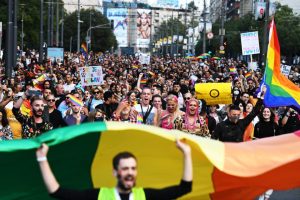 FOTO:Vesna Lalić
FOTO:Vesna Lalić
March 23rd - The social dialogue on the Draft Law on Same-Seks Unions initiated by the Ministry for Human and Minority Rights and Social Dialogue was completed. The social dialogue took place with the participation of 61 institutions and organizations. A total of 13 submitters provided comments with objections and suggestions - 4 institutions, 4 organizations, including groups of organizations that submitted joint comments, one political party, and four citizens. May 1st - The President of the Republic of Serbia, Aleksandar Vučić, stated that the current Constitution "refers to the Family Law, which defines marriage as a legally regulated union between a man and a woman," which is why, according to the President's words, there is no possibility for him to sign the law on same-sex partnerships. After this statement, further work on the law seemed to have been halted, with the explanation that the law needs to be aligned with the expert opinion of the Council of Europe. August 21st - At the closing ceremony of World Pride in Copenhagen, the representatives of Belgrade Pride were officially handed the title of host for Euro Pride. For the first time Euro Pride would take place in Southeastern Europe, in 2022, in Belgrade from September 12th to 18th. September 18th - Another successful Belgrade Pride was held under the slogan "Ljubav je zakon“ (Love is the Law) which was also one of the slogans of the campaign for signing the petition for the adoption of the law on same-sex partnerships, that was signed by over 13,000 citizens. During Pride Week, around 40 cultural, artistic, and educational events were held, and Pride was supported by the highest number of companies to date, including some major international ones. The Godmother of Pride, Nataša Bekvalac, stated that she accepted this title not only to support the LGBTI+ community but also because she, as an ally, is a part of it. After more than three thousand people participated in the Pride March, sending clear slogans and messages to improve the position of the LGBTI+ community in Serbia, a concert was held in park Manjež, featuring performances by well-known domestic pop and rap singers, DJs, and drag queens. November 21st - The Minister for Human and Minority Rights and Social Dialogue stated that her ministry has aligned the existing Draft Law on Same-Sex Partnerships with the expert opinion of the Council of Europe, which arrived in June 2021. This marks the completion of the final procedural step before the Law is sent for consideration to the Government, which should then forward it to the Parliament for deliberation, adoption, or rejection. December 10th - For the International Human Rights Day, Belgrade Pride sent letters to all ministries of the Republic of Serbia to remind them that LGBTI+ individuals are equal citizens of Serbia and that the Government of Serbia has a duty to work on improving the position of the LGBTI+ community, as one of the minority groups in this country, primarily regarding the legal regulation of same-sex partnerships. Enhancing the state of human rights for all citizens must be a focus of the Government of Serbia, and the pursuit of equality is the foundation of every democratic society.
2022
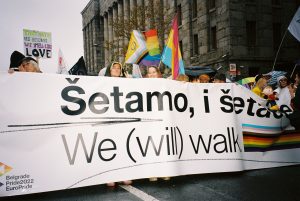 FOTO: Filip Bojović
FOTO: Filip Bojović
July – The EuroPride volunteer academy was launched. During the course of two months, over 150 young people from Serbia and abroad went through an educational program, covering topics such as LGBTI+ activism, history, rights and the position of the LGBTI+ community and inclusive feminism. August - Ahead of intense preparations for EuroPride 2022, scheduled for September that year, there was increasing pressure put on the organizers, the community and the event itself. Thousands of people took part in religious processions, held weekly, up until the EuroPride walk. The demand of these gatherings was, among other things, the cancellation of EuroPride march, allegedly due to protecting traditional and family values. Over 30 thousand people signed the petition against EuroPride. Many media outlets also put pressure on the LGBTI+ community, spreading misinformation that EuroPride would contribute to the spread of monkeypox epidemic in Serbia. During a press conference, The President of the Republic of Serbia, Aleksandar Vučić, announces that EuroPride will be cancelled or postponed due to “safety concerns”. September 12th – The flag is symbolically raised in front of the Palace of Serbia, accompanied by a speech from the Pride Godmother, Sajsi MC, officially opening Pride Week, with over 130 events – debates, workshops, theatre performances, exhibits, film screenings, and parties. One of the most significant events during Pride Week was the International Conference on Human Rights, which lasted for 4 days and brought together over a thousand participants from all over the world. Among them were members of the European Parliament, officials from EU countries and ambassadors. The conference provided a space for learning, discussion, experience sharing, networking and defining plans for improving the position of the LGBTI+ community in Serbia and the region. September 13th – Despite receiving assurances that there would be no official ban, in late afternoon hours, the Ministry of Internal Affairs of Serbia (MUP) issued an official ban of the Pride march. Pride Week continued without any problems. September 14th - MUP rejected the appeal against the ban. Pride Week wemt on with the majority of international guests coming to Belgrade on this day. September 15th – The organizers filed a lawsuit with the Administrative Court regarding the ban while simultaneously announcing a march with a new route. All international media outlets report on the events in Belgrade, and the organizers received support for their decision to march despite the bans. Pride Week continued as planned. September 16th – The night before EuroPride, Minister of Police Aleksandar Vulin announces that the ban on the march remains in effect and that he “did not give in to the pressures of Western powers”. After intense negotiations between the organizers and representatives of the Government of Serbia, a compromise was found in the form of a shortened route, which is officially communicated to the police as “escorting participants to the concert venue”. September 17th - EuroPride took place, but the route was significantly shortened and altered from the original plan. This was undoubtedly a historic event for Serbia and the region, as well as an important step towards achieving equality, with around 10,000 attendees participating in the march. For the first time since the beginning of Belgrade Pride, the concert activities lasted for two days, featuring performers such as Mahmut Orhan, Bojana Vunturišević, Sara Jo, Senidah, Angellina, Sajsi MC, Roi Perez, Patrick Mason and others, at Tašmajdan on Friday, September 16th and after the protest march on Saturday, September 17th. Between the musical performances, many local drag queens showcased their lip-syncing skills, and Lana Vee was crowned as the Queen of EuroPride 2022. By the end of the day, the police had detained 87 individuals for participating in incidents, which were mostly attacks on police, with 13 officers injured. A total of 5,200 police officers were deployed. On the way back from the march, hooligans and far-right extremists attacked several activists and Pride visitors, who suffered minor injuries. October 10th - During morning hours, The Ministry of Internal Affairs of Serbia conducted an operation, arresting 21 individuals for attacking police officers during the EuroPride event. No one was arrested or prosecuted for attacks on activists and EuroPride attendees.
2023
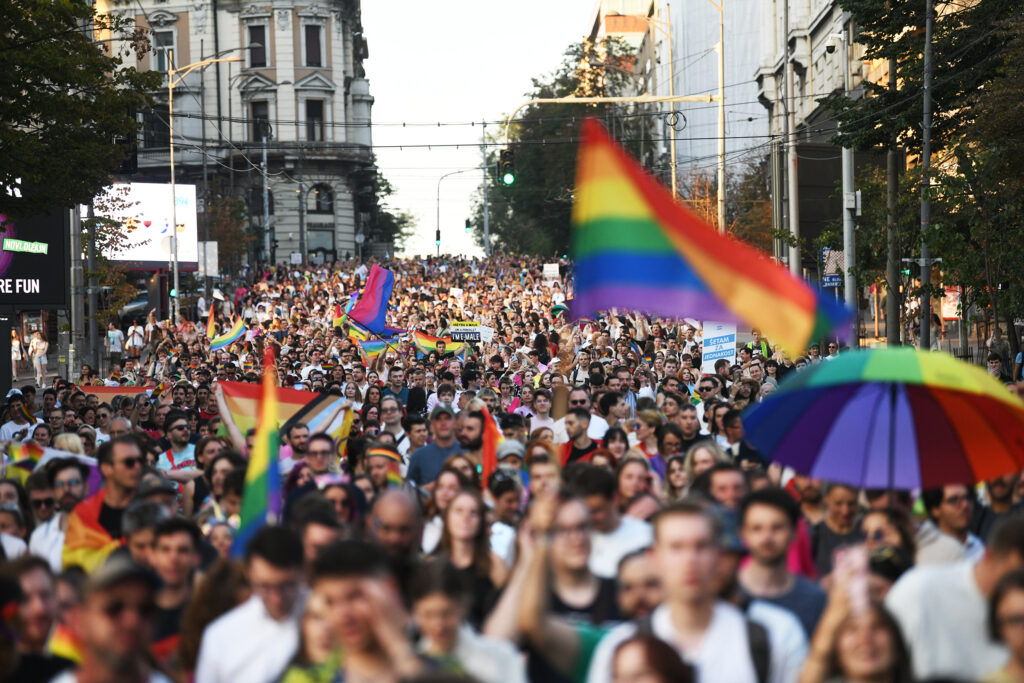
(FOTO:Vesna Lalić)
March 3rd – At night between the 27th and 28th of February in Manjež park in the center of Belgrade, members of the Skinhead movement attacked three people. Among other things, one of the motivations behind the attack was the sexuality of one of the survivors. One young man was gravely injured due to a knife attack, while the second was assailed with a broken bottle.
Following this attack Belgrade Pride and the organization „Da se zna!“ organized a protest „Hate kills“ in Menjaž park. Several hundred people showed up at the protest, where they demanded the arrest and legal reprimand of the assailants according to article 54a of the Criminal Law.
At the same time, they demanded the timely and adequate response of the police and judicial services against attacks committed towards the attacks aimed at the LGBTIQ community.
June 15th – The event „Belgrade Pride: Moments from the mast and visions for the future“, at which was the premiere of the documentary filk „We Will Walk“ („Uvek ćemo šetati“). This movie gave a deep retrospective view into EuroPride 2022. in Belgrade. After the showing, the photo monography “We Will Walk” (“Šetaćemo”) was displayed. These photos show personal and authentic moments from EuroPride 2022. along with a look from behind the scenes of EuroPride Week 2022. The monography is a collaboration between authors Filip Bojović and Uroš Tanacković. The program for Pride Week 2023 was also presented that evening, which was scheduled between the 4th and 10th September of 2023.
June 30th – After a several month long evaluation of EuroPride 2022 and individual meetings with a great many number of organizations that engage with the human rights of the LGBTI+ community, the process, procedures and politics of Belgrade Pride was finalized. The plenary meeting between all the Belgrade, Novi Sad and Šabac organizations was help on the 30th of June 2023. During that meeting a new structure was formed for Belgrade Pride which is made up of six governing bodies: The Committee, The Organizational Board, The Operation Board, Pride Info Center, The Complaints Board and the Commissar for Inclusion and Diversity.
July 3rd – Noa Milivojev, an eighteen-year-old transgender girl from Kovilj, whom has been missing since the 17th of June 2023. , was found during the afternoon hours murdered in Belgrade. That same day, several hundred people gathered at The Republic Square in Belgrade, to hold a candlelight vigil in honor of her. Belgrade Pride appealed to the media to hold themselves to the professional and ethic standards defined in the Codex of Journalists of Serbia while reporting on this and other similar crimes, while also not using the discrimination against the LGBTI+ community for the sake of profit. After the end of the vigil – an unknown passerby destroyed the candles, trans flags and Noa’s photos which were gathered by the participants of the vigil at The Republic Square.
August 9th – Writing the slogan on the Pride Info Center, Belgrade Pride started a campaign promoting the Pride 2023. slogan (“Nismo ni blizu”), highlighting that the LGBTI+ community in Serbia, despite efforts by various organizations and activists, still faces violence and discrimination, including refusal from the state to legally regulate same-sex unions. With that in mind the slogan “Nismo ni blizu” paints and celebrates LGBTI+ accomplishments but also recognizes and draws attention to the constant battle for equality.
August 13th – The President of Serbia, Aleksandar Vučić, announced that he won’t be signing the Law for same-sex unions, which Belgrade Pride condemned and reiterated that this is only one in a chain of unacceptable statements that President Vučić has made towards the LGBTI+ community. During the same address Aleksandar Vučić, besides spurring the Law for same-sex unions which he refused to sign, mentioned specific terms such as “madness that exists within woke movements”, or “the third gender”.
August 14th – The Youth Initiative for Human Rights, in collaboration with numerous organizations which are a part of Belgrade Pride, started the Pride volunteer academy. Around 70 participants got acquainted with the history of the LGBTI+ movement in Serbia, basic terminology regarding sex and gender, along with media reporting of LGBTI+ topics. Furthermore, participants had the chance to train their communication skills and public performing, and to familiarize themselves through examples from praxis with the process of volunteer work for Pride week and during the march itself.
September 1st – Ida Prester, singer for the band “Lollobrigida” became the Godmother of Belgrade Pride 2023.
September 4th – “Pride week” 2023. was opened on the 4th of September on the plateau in front of the “Victor” statue in Kalemegdan. With a protest performance, activists let the public know that human rights of the LGBTI+ community in Serbia are still disregarded. They reminded them that not a single demand from Belgrade Pride has been implemented. The adoption of the Law for same-sex unions,and the Law for gender identity, the bettering of medical care for trans people were highlighted as the main demands for this year’s Belgrade Pride.
September 8th – Delegates from the Green-left Front submitted a proposal for a civil union to the National Assembly, by which this proposal entered into assembly procedures.
September 4-10th – Pride week 2023. was held, which encompassed 55 events of various styles and formats. Multiple debates were held, lectures, parties, art shows, plays, and talks with the community et cetera. Events were held on 15 different locations in Belgrade and yet again managed to bring together various civil organizations, activists, artists, drag collectives and performance troupes.
October 21st – In Belgrade, a monument dedicated to Vjeran Miladinović Merlinka was vandalized. The monument was made by an unknown author which had the goal of preserving the memory of Merlinka who was an artist and a heroine to the queer community in Serbia, she was brutally murdered.
November 6th – Alex Elektra, one of the Queens of Belgrade Pride, became the first drag queen to walk at Belgrade Fashion Week.
November 20th – Together with Geten, Belgrade Pride memorated the Trans Day of Remembrance by lighting candles at The Republic Square. According to the report by the team behind “Transrespect Vs Transphobia Worldwide” monitoring the murders of trans people, which the organization “Transgender Europe” published in the face of Trans Day of Remembrance annually, there have been a total of 320 recorded murders against trans and gender-variant people between the 1st of October 2022. And 30th of October 2023.
December 13th – The Women in black and Belgrade Pride organized a protest in front of the Russian Federation Embassy as a direct response to the ban of LGBT movements in Russia. The Supreme Court of Russia had red-marked any and all LGBT movements as extremist and banned all of their activities within the Russian territory on November the 30th. This move represents yet another form of persecution of LGBTI+ people in Russia.






